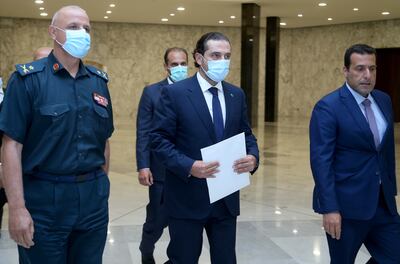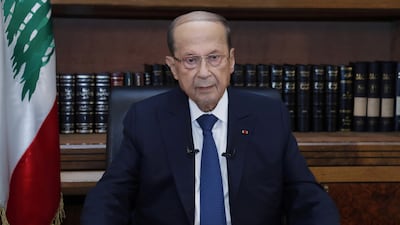As Lebanon’s government formation process continues, with hope for a successful resolution this time, Michel Aoun can take pride in a singular achievement in having augmented his presidential powers. However, given Mr Aoun’s propensity to make gains without considering the devastating impact of how he achieves his successes, he may also have undermined the presidential ambitions of his son in law Gebran Bassil.
When Saad Hariri began forming a government in October 2020, he approached the task with an interpretation of the constitution that minimised the presidency’s role in the process. According to the constitution, both the prime minister-designate’s and the president’s signatures are required for a government to be formed. Mr Aoun insisted that this condition made him an active partner in naming ministers, with which Mr Hariri disagreed.
Clarifying the president’s powers has profound political and sectarian implications. The Lebanese president is always a Maronite Christian, while the prime minister is always a Sunni Muslim. The constitution, which was amended after the Taif agreement of 1989, greatly reduced the president’s powers to the advantage of the Council of Ministers. Mr Aoun was never happy with this.
For Mr Hariri, the president can ask for some changes in ministerial candidates, but he is not a full partner in naming ministers. The prime minister-designate alone has that latitude. But Mr Aoun, seeing that he has veto power over the establishment of a government, interpreted his mandate more forcefully. The reality is that nothing in the constitution explicitly prevents him from doing so.

When a frustrated Mr Hariri stepped down a few weeks ago, he was replaced by another former prime minister, Najib Mikati. Unlike Mr Hariri, Mr Mikati avoided getting bogged down in a fight over prerogatives. He doubtless realised that the dispute could not be resolved now, and that Lebanon, which is collapsing rapidly, had no time to waste on obscure constitutional issues.
Mr Mikati’s choice, then, was to begin a dialogue with the president and meet with him every few days, sometimes even daily, to reach an understanding. By doing this, however, he implicitly approved of Mr Aoun’s interpretation of the constitution. Henceforth, no Maronite president will take a backseat role in the government-formation process, as has been the case since 1989.
This raises interesting possibilities for the future. Many Maronites have long considered the post-1989 constitution as a catastrophe for their community. By abolishing many of the president’s powers, they feel, it effectively weakened the community as a whole. However, Mr Aoun, who has stubbornly insisted that the president is no potted plant, has created a situation in which many Maronites may now come to look at the constitution differently.
That’s not a bad thing. Moreover, if there is a greater consensus between the president and prime minister over cabinets in the future, it could potentially lessen the polarisation that has become the norm in the country’s politics. This may be an optimistic reading, but if there is a shared policy vision from the start, that can perhaps help create governments that are more cohesive than before.
While Mr Aoun can be credited with a win, the fact that he has blocked a government since October of last year to impose his interpretation of the constitution may come back to haunt him. That’s because in the interim, Lebanon has deteriorated radically, to the point of being paralysed today. Mr Aoun may have scored a victory, but most Lebanese certainly don’t share the enthusiasm.

This is reminiscent of what happened when Mr Aoun headed a military government in 1989 and launched a “war of liberation” against Syrian military forces in Lebanon. At the time he had succeeded in regionalising the question of the Syrian presence, when a tripartite Arab committee intervened to find a resolution. This was no mean feat, as the Syrian regime had always considered Lebanon its private reserve, in which Syria’s influence had to be exclusive.
That intervention led to the Taif accord. The accord was effectively a Saudi-Syrian agreement over Lebanon, supported by the US, that sought to end the country’s civil war. It involved amending the constitution, redistributing powers among Lebanon’s sects and starting a process of political and administrative reform (many of whose clauses were never implemented).
Yet Mr Aoun rejected Taif and held out against growing regional and international pressure on him, until October 1990. That is when the Syrian military expelled him from office, sending him into a 15-year exile.
The lesson was a simple one. When Mr Aoun secures a significant advantage, he often overplays his hand and loses everything. That may not happen today over a government, but his main priority is to bring in Mr Bassil, as his successor. His long delay in approving a cabinet may have made the economic crisis so dire that it has undercut his son in law’s presidential hopes.
Mr Aoun is a paradoxical figure. No one ever expected him to come so far, but he is almost unrivalled in the destruction his agendas have visited on Lebanon. Some Maronites may applaud his handling of the government-formation process, but many more will blame him and his son in law for augmenting their suffering.


